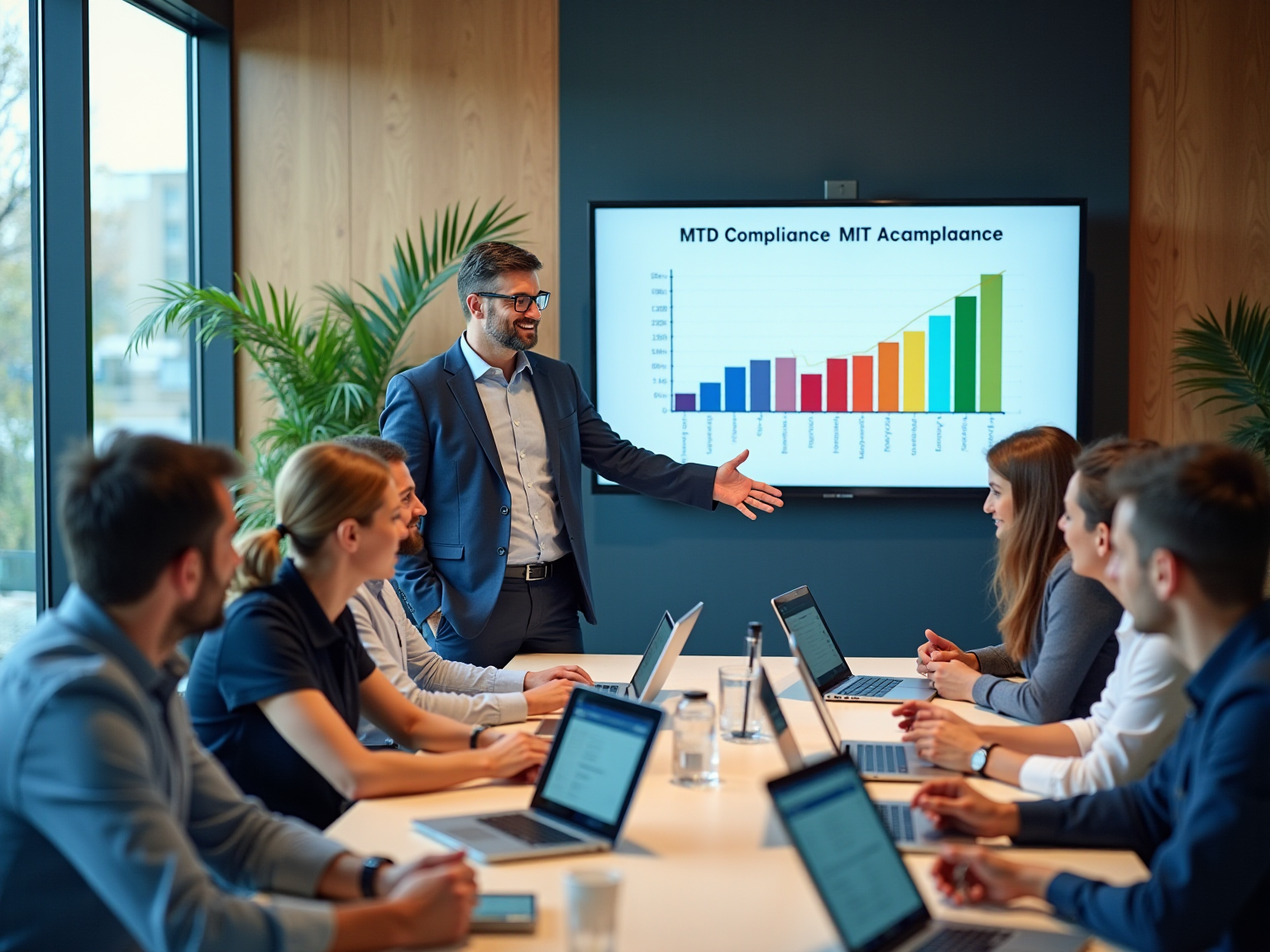Overview
Mastering MTD compliance is crucial for accountants, and the essential steps to achieve this include:
- Maintaining digital records
- Submitting quarterly updates to HMRC
- Utilising MTD-compliant software for tax returns
These practises not only help avoid penalties—such as the £400 fine for paper submissions—but also significantly enhance operational efficiency and client engagement. By streamlining processes and fostering effective communication, accountants can navigate the complexities of MTD with confidence and ease.
Key Highlights:
- Making Tax Digital (MTD) requires businesses to maintain digital records and submit tax information electronically, streamlining the tax reporting process.
- MTD compliance can reduce errors associated with manual data entry, enhancing operational efficiency for accountants.
- A £400 penalty applies for submitting paper VAT returns without an exemption, urging the adoption of digital systems.
- Statistics show that 26% of businesses report no significant cost impact from MTD compliance, while 34.5% experienced increased expenses.
- Accountants must maintain digital records, submit quarterly updates, and file digital tax returns to comply with MTD requirements.
- Software solutions like Xero, QuickBooks, Sage, and Glasscubes MTD Assist are available to help accountants meet MTD standards and improve client engagement.
- Best practises for client engagement under MTD include regular communication, providing educational resources, and leveraging technology for streamlined information requests.
- Firms using Glasscubes reported a 40% increase in customer response rates and significant time savings in information gathering.
- Proactive assistance and feedback mechanisms are essential for enhancing client satisfaction and ensuring compliance with MTD regulations.
Introduction
In the rapidly evolving landscape of taxation, Making Tax Digital (MTD) emerges as a transformative initiative that is reshaping the operations of accountants across the UK. By mandating digital record-keeping and electronic submissions, MTD streamlines tax reporting while paving the way for enhanced accuracy and efficiency.
As accountants navigate this new terrain, it becomes paramount to understand the compliance requirements, explore suitable software solutions, and implement best practices for client engagement.
Real-world examples illustrate the tangible benefits of MTD, making the urgency for accountants to adapt to this digital shift clearer than ever. Embracing MTD is not merely about compliance; it presents an opportunity to elevate service delivery and foster stronger client relationships in an increasingly digital world.
Define Making Tax Digital: Importance for Accountants
The initiative known as MTD signifies a transformative change in the UK tax landscape, requiring businesses and individuals to maintain digital records and submit tax information electronically. This initiative is vital for financial professionals, as it streamlines the tax reporting process and significantly mitigates the errors typically associated with manual data entry.
By embracing the concept of MTD, financial professionals can elevate client engagement through timely updates and more efficient communication, while statistics illustrate that:
- 26% of businesses report no significant cost impact from MTD compliance.
- 34.5% noted an increase in expenses due to compliance requirements.
Additionally, a £400 penalty is imposed for submitting a paper VAT return without an exemption, highlighting the urgency for financial professionals to adopt digital systems. Those who integrate MTD can enhance their operational efficiency and minimise the time dedicated to traditional methods.
Consider the case of Sarah, who improved her efficiency and accuracy in financial reporting for her boutique clothing store by complying with MTD. By implementing the MTD system, Sarah streamlined her reporting processes, resulting in more precise financial statements and timely submissions.
Moreover, testimonials from users like Sophie Montgomery of TaxAssist Accountants underscore the substantial time savings achievable through MTD, with claims of 288 hours saved in just one tax season. As we approach 2025, the importance of MTD for financial professionals becomes increasingly apparent.
By utilising digital tax platforms such as Glasscubes, financial professionals can refine their service provision, ensuring compliance with evolving regulations while enhancing communication with clients. Glasscubes offers automated reminders and real-time progress tracking, significantly boosting response rates and reducing the time spent on information gathering.
Consulting firms like Forth Accountancy provide essential support for those navigating the transition to MTD, offering guidance on best practices and ensuring seamless integration into their operations. Ultimately, MTD is not merely a regulatory requirement; it presents an opportunity for professionals to optimise their workflows and elevate client satisfaction.
Outline MTD Compliance Requirements for Accountants
To comply with MTD (Making Tax Digital), accountants must adhere to several key requirements.
- Digital Record Keeping: Accountants are required to maintain accurate digital records of all transactions, ensuring that data is easily accessible and organised. This is essential for meeting regulatory standards and enabling efficient reporting.
- Quarterly Updates: Firms must submit income and expense information to HMRC every three months. This regular reporting not only maintains transparency but also allows for timely adjustments to financial strategies.
- Digital Tax Returns: Annual tax returns must be filed using software that is compliant with MTD regulations. This ensures that submissions are accurate and meet the latest regulatory standards, significantly reducing the risk of penalties.
- Customer Engagement: Regular communication with customers regarding their obligations under MTD is essential. Accountants should proactively notify customers about deadlines and required documentation, fostering adherence and preventing last-minute issues. Utilising Glasscubes’ automated reminder feature can significantly enhance this process, allowing financial professionals to send customised reminders tailored to each client’s needs, ensuring they stay informed and engaged.
- Utilising software that is compatible with MTD is vital for seamless reporting and adherence to regulations. Accountants should guarantee their tools are current and able to integrate with HMRC systems.
- Statistics indicate that by 2025, a notable percentage of accountants are anticipated to meet MTD requirements, with tools such as IRIS Elements designed to assist accountants in addressing MTD challenges.
- Effective strategies for MTD adherence have been documented in various case studies, including the forthcoming public beta testing for MTD in 2025, which aims to enhance MTD based on actual user experiences.
- For instance, companies employing tools such as Glasscubes have reported significant time savings, with Sophie Montgomery of TaxAssist Accountants noting an impressive 288 hours saved in a single tax season. This showcases the advantages of streamlined communication and effective information collection, while expert insights emphasise the importance of digital record keeping under MTD, highlighting that firms adopting MTD requirements not only boost adherence but also enhance overall operational efficiency.
- Moreover, it is crucial to recognise that customers unable to obtain a National Insurance Number will be exempt from MTD requirements. As the landscape evolves, remaining aware of MTD regulations will be vital for financial professionals aiming to thrive in this digital age.
Explore Software Solutions for MTD Implementation
A range of software options is accessible to assist accountants in achieving MTD. Notable options include:
- Xero: This platform excels in digital record-keeping and tax submissions, offering features that simplify regulatory processes. Its powerful capabilities help businesses manage finances efficiently, reducing reliance on outdated systems. Case studies demonstrate successful migrations to Xero, ensuring a seamless transition with accurate historical data and improved financial management, which are crucial for compliance with MTD.
- QuickBooks: Renowned for its intuitive interface, QuickBooks offers robust reporting capabilities that facilitate effective financial oversight and regulation. Its features include automated tax calculations and easy integration with HMRC, making it a strong choice for accountants.
- Sage: Tailored for businesses of varying sizes, Sage offers solutions that comply with MTD and adapt to specific operational needs, ensuring seamless integration with existing workflows. Its comprehensive reporting tools and real-time data access assist financial professionals in maintaining compliance with the MTD requirements.
- Glasscubes MTD Assist: Created specifically for financial professionals, Glasscubes boosts engagement with customers and simplifies information collection, tackling the time-consuming aspect of gathering data across teams. Companies using Glasscubes have reported a 50% decrease in response times and a 40% increase in customer interaction, demonstrating its effectiveness in enhancing communication. Additionally, Glasscubes guarantees that all customer information is gathered in a way that adheres to HMRC regulations, further assisting financial professionals in their MTD processes. Its automated reminders and real-time progress reporting eliminate the hassle of chasing late responses, making it as simple and convenient to use as email without the limitations. Furthermore, Glasscubes is secure, encrypted, and GDPR compliant, providing peace of mind for both firms and clients.
When selecting software, it is crucial to ensure that it meets HMRC requirements and integrates smoothly with current systems, thereby enhancing overall efficiency and compliance.
Implement Best Practices for Client Engagement Under MTD
To enhance client engagement under MTD, accountants must implement best practices that not only ensure compliance but also foster stronger relationships with clients.
- Regular Communication: Establish a schedule for periodic updates that keep customers informed about MTD and its requirements and deadlines. This proactive approach fosters transparency and trust, essential elements in client relationships.
- Educational Resources: Provide clients with comprehensive guides and resources that clarify their obligations under MTD regulations. By empowering them to take informed actions, confusion is significantly reduced, leading to a smoother transition.
- Utilise Technology: Leverage platforms like Glasscubes to streamline information requests and improve customer interactions. Automating reminders and centralising communication can drastically reduce the time spent on follow-ups. Firms utilising Glasscubes have reported a 40% rise in customer response rates, as clients appreciate the transparency and simplicity of accessing their information in one secure workspace. As Steve, an audit manager at MGI, aptly noted, “We feel like we’re receiving quicker replies from customers by requesting information through Glasscubes instead of how we previously did via emails.”
- Feedback Mechanisms: Encourage customers to share their concerns and feedback regarding the MTD. This practice not only enhances service delivery but also fortifies relationships with clients, ensuring their voices are heard.
- Proactive Assistance: Provide tailored support to clients, assisting them in navigating the intricacies of the MTD regulations. Case studies, such as PKB Accountants’ successful transition to digital tools during the COVID-19 pandemic, highlight the benefits of personalised assistance, including improved bookkeeping accuracy and real-time access to tax information. Jennifer Day, a mobile farm administrator in South Wiltshire, shared her positive experience with MTD for VAT, noting that the collaboration between HMRC and her software provider made the system easy to use.
By adopting these strategies, accountants can significantly enhance client satisfaction and ensure compliance with MTD regulations, ultimately leading to a more efficient and effective accounting practice.

Conclusion
The transition to Making Tax Digital (MTD) is not merely a regulatory shift; it represents a fundamental opportunity for accountants to revolutionise their practises. By embracing digital record-keeping, quarterly updates, and MTD-compliant software, accountants can significantly enhance their operational efficiency and accuracy in tax reporting. Case studies and statistics underscore the tangible benefits of MTD compliance, including remarkable time savings and improved communication with clients.
Moreover, implementing best practises for client engagement under MTD is essential. Regular communication, educational resources, and proactive support play crucial roles in fostering trust and transparency between accountants and their clients. Utilising technology, such as platforms like Glasscubes, streamlines processes and boosts client interaction, ultimately leading to a more satisfying experience for all parties involved.
As the landscape of taxation continues to evolve, accountants must remain informed and adaptable. The urgency to comply with MTD requirements is evident, and those who embrace this digital transformation will likely find themselves at a competitive advantage. By viewing MTD as an opportunity rather than a burden, accountants can elevate their service delivery, strengthen client relationships, and position themselves for success in a rapidly changing digital world.
